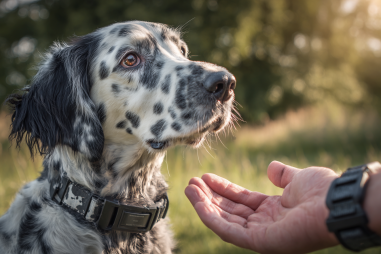English Setters have long been admired for their beautiful coats and graceful demeanor, but beyond their striking appearance lies a breed known for its loving and gentle temperament. For families considering a pet that can keep up with an active lifestyle while offering companionship and affection, the English Setter might just be the perfect choice. This article explores the suitability of English Setters as family dogs, highlighting their temperament with children, exercise needs, training considerations, and the benefits they bring to a household.
English Setter Temperament with Kids
One of the most appealing qualities of English Setters is their friendly and affectionate nature, which tends to make them excellent companions for children. These dogs are generally patient and gentle, often forming strong bonds with the younger members of the family. Their sociable disposition means they enjoy being part of family activities and can usually adapt well to the lively and sometimes unpredictable energy that kids bring.
English Setters are typically non-aggressive and sensitive dogs, which helps them respond well to children’s playful antics without becoming stressed or irritable. However, as with any dog breed, it’s important to supervise interactions between young children and the dog to ensure respectful handling and to teach kids how to properly engage with their furry friend. This breed appreciates kindness and consistency and will often reciprocate with loyalty and affection.
Activity Level and Interaction Needs
One key factor to consider when choosing an English Setter as a family pet is their high energy level. Originating as hunting dogs, English Setters were bred to be running and retrieving partners, so they have plenty of stamina and love for physical activity. This means they thrive in families who can provide daily exercise and mental stimulation.
English Setters enjoy activities such as long walks, hiking, playing fetch, and even agility training. Without sufficient outlet for their energy, these dogs may develop behavioral issues such as chewing, digging, or excessive barking. Families who lead an active lifestyle or have a spacious backyard where the dog can safely run and explore are ideal matches for this breed.
Interaction and companionship are also important; English Setters can suffer from separation anxiety if left alone for long periods. They are happiest when included in family routines, whether that means cuddling on the couch or joining outdoor adventures. This breed’s affectionate nature means they genuinely enjoy spending quality time with their human family members.
Challenges and Adaptations for Families
While there are many positives to raising an English Setter, potential challenges should be acknowledged to ensure the breed fits well within your family dynamic. Their long, silky coats require regular grooming to prevent matting and maintain their beautiful appearance, which can be time-consuming for busy households. Weekly brushing, combined with occasional professional grooming, helps keep their coat healthy and reduces shedding.
Due to their hunting heritage, some English Setters have a strong prey drive and may be tempted to chase small animals if not properly trained or monitored. Families with cats or smaller pets will need to invest in socialization and training from an early age to foster coexistence.
Another challenge is their sensitivity. English Setters respond best to gentle and positive reinforcement rather than harsh discipline. Families must be prepared to create a patient and supportive training environment to help their dog flourish and feel secure.
Training for a Family-Friendly Environment
Training an English Setter effectively is key to ensuring they are well-adjusted members of the family. Because they are intelligent and eager to please, they generally respond well to consistent, rewards-based training techniques such as treats, praise, and playtime. Starting training early, especially with basic commands and socialization, sets the foundation for a happy and obedient companion.
Family members, especially children, should be taught how to communicate clearly and calmly with the dog. This includes respecting the dog’s space when it needs rest and understanding canine body language. Enrolling your dog in puppy classes or obedience training can be a great way for everyone to learn together and strengthen the bond.
Given their energy and intelligence, mental enrichment activities can also be beneficial, such as puzzle toys, scent games, and interactive play. This not only keeps their mind sharp but can reduce unwanted behaviors stemming from boredom.
Benefits of Having an English Setter as a Pet
Choosing an English Setter as a family pet comes with a wealth of benefits that far outweigh the challenges. Their loving and gentle nature lends itself well to creating a harmonious home where everyone feels connected. Here are some benefits that families often highlight:
- Companionship: English Setters are affectionate and loyal, often forming deep bonds with every family member.
- Great with kids: Their playful and patient temperament typically makes them excellent playmates and protectors of children.
- Social and friendly: They usually get along well with other dogs and meet new people with a friendly attitude.
- Active partner: Their love for physical activity encourages families to lead healthier, more active lifestyles.
- Emotional support: Their empathetic nature allows them to provide comfort and reduce stress in busy family environments.
Many owners also appreciate the elegance and unique beauty of the English Setter, which makes them a joy to care for and share their lives with.
What Families Are Saying
Owner testimonials often reinforce the suitability of English Setters as family dogs. Lisa, a mother of two from Ohio, shares, “Our English Setter has been a wonderful addition to our family. She is gentle with our kids and constantly keeps us on the move. While grooming takes some effort, her loving nature and goofy personality make every moment worth it.”
Mark, a father and outdoor enthusiast, says, “I wanted a dog that could match our hiking trips, and the English Setter fits perfectly. He’s patient with our young children, loves to explore, and cuddles like a lap dog after a long day. We couldn’t ask for a better family pet.”
These stories reflect the rewarding experience many families have when welcoming an English Setter into their home.
Finding the Right Fit for Your Family
In summary, English Setters can make excellent family dogs for those willing to commit to their exercise, grooming, and training needs. Their friendly disposition, love for children, and eagerness to be part of family life make them a wonderful companion in active and caring households. If you value a dog that is both a playful buddy and a loyal friend, the English Setter could be the breed to complete your family.







